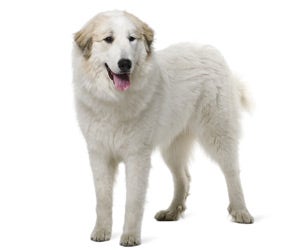Great Pyrenees
-
Overview
The Grand Pyrenees is a noble, powerful breed from the mountains of France. These giant dogs, who generally weigh over 100 pounds and stand up to 30 inches tall, are effective guard dogs who bond loyally to their owners and expect the trust to be returned. These dogs make devoted, protective companions for owners who have plenty of time to teach their huge dog polite manners. They need to be exercised and socialized, but they also need to be taken seriously by their owners. They are serious guard dogs who expect to trust and be trusted. Once they've bonded to their family, they are diligent, affectionate companions.
-
Personality
-
Coat Care

They will require frequent brushing with a slicker brush and a metal comb to remove dead hairs and keep the coat looking shiny and healthy. Twice a year, when the Pyr sheds, he will need to be brushed even more frequently to prevent matting and tangling of dead hair in the coat.
These dogs also need to be bathed, which can be a challenge if you don't help your large dog become accustomed to bath time as a puppy.
Generally the Great Pyrenees' eyebrows, whiskers, ears, hocks, feet, and forelegs are trimmed, although that's usually for dogs showing in conformation. Working dogs or dogs who live in areas with lots of room to run will need to have the hair around the pads of their feet trimmed frequently, because this hair picks up burs and can mat painfully between the dog's toes.
Pyrs have double declaws on the backs of their legs which help them climb up and down tough terrain in their mountainous homelands. These should not be removed because they give the Pyr their powerful, bounding gait.
Their floppy ears need to be washed out and checked for infection.
Many owners do not realize how important it is to brush your pet’s teeth on a regular basis. Some dogs are prone to dental problems and sensitive teeth, especially small dogs with tiny teeth and dogs with special diets. These problems can be easily combatted with frequent brushing.
Cavities are rare with dogs but gum disease caused by tartar buildup is not, which is why they require regular brushing with toothpaste and a toothbrush formulated specifically for dogs. While daily brushing is ideal, doing so on a weekly basis will be a big help in avoiding the need to bring your dog to a veterinarian for a cleaning, which usually has to be done under sedation.

 India (English)
India (English)
 Middle East and Africa (English)
Middle East and Africa (English)
 South Africa (English)
South Africa (English)
 Australia (English)
Australia (English)
 Japan (日本語)
Japan (日本語)
 South East Asia (English)
South East Asia (English)
 Singapore (English)
Singapore (English)
 Europe (English)
Europe (English)
 United Kingdom (English)
United Kingdom (English)
 Argentina (Español)
Argentina (Español)
 Brazil (Portuguese)
Brazil (Portuguese)
 Colombia (Español)
Colombia (Español)
 Latin America (Español)
Latin America (Español)
 México (Español)
México (Español)
 Chile (Español)
Chile (Español)
 Peru (Español)
Peru (Español)
 Canada (English)
Canada (English)

